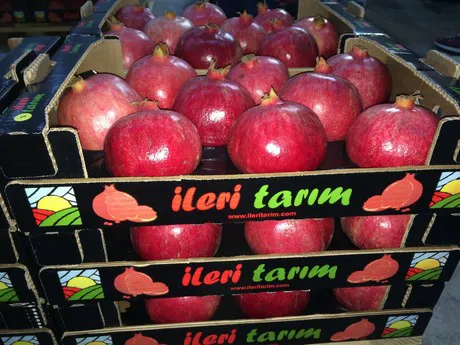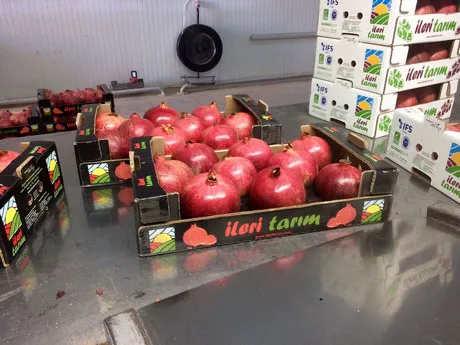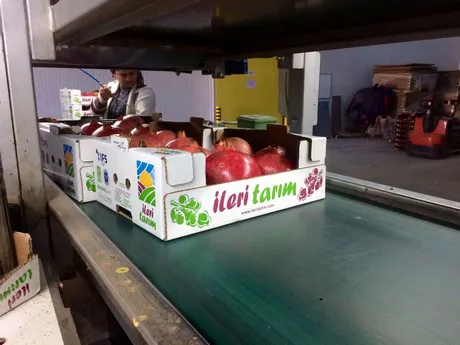The pomegranate harvesting season in Turkey is coming to an end, after having started about ten days early. Although the volumes are good, the climate is worrying and causing some issues with the quality of the produce. Luckily for Hakan Ilkkutlu, who works for export company Ileri Tarim, this only concerns a small amount of the total crops.
The Turkish pomegranate season has been fairly good, although the warm weather has caused some issues. It is still 22 degrees Celcius in Turkey at the moment, which is very surprising to Hakan Ilkkutlu, managing partner of Ileri Tarim: “The season started about a week or ten days early due to the warm weather. This resulted in bigger sizes, and thus more pomegranates per hectare. However it also means part of the produce had issues with the coloring, not showing the deep dark red that our customers love. We chose to let the pomegranates mature a bit longer, but due to the big difference in temperature between day and night, this caused cracking in the skin. It means we have sent a larger amount of pomegranates for processing than usual, which will be used for juices, syrups and molasses. Of course we get the lowest price when selling pomegranates for processing, but luckily a 25% increase of the produce this harvest will compensate for it.”

The prices for the pomegranate started a bit lower this season, mostly due to the warm weather. Especially in the domestic market, pomegranates are usually consumed when the weather gets a bit colder, Ilkkutlu explains: “Once the temperature goes down, we’ll see an increase in demand of the pomegranates. It’s actually something that happens our grapes as well, but the other way around. When it’s warm people want to eat the green grapes, but once it gets colder the product is a lot less popular.”
As an export company, Ileri Tarim is not dependent on the domestic market for their pomegranates as they export their produce to a big part of Europe: “Our main market can be found in Europe. We export to the United Kingdom, the Netherlands, Belgium, Germany and Ukraine, but we also have clients in Hong Kong. For the future we are planning to explore the Chinese market more, but there’s a lot of bureaucracy that comes with it.”

With Egypt now forcing certain certificates on exporters before they can export their pomegranates, their quality should go up. Ilkkutlu isn’t worried about Egypt as a big competitor though: “When we think of Egyptian pomegranates, we think of lower quality. They do have an advantage over us when it comes to prices, as they’re typically lower than ours. However our competitive edge is the fact that we control all the process end to end strictly to ensure pesticide free, high quality pomegranates and we have an automated sorting line that allows us to sort the pomegranates by size, color or weight. We can basically deal with any of the specific requirements that our clients set for us. We keep a very high standard and allow supermarkets to sell our pomegranates individually, where the Egyptians will usually sell by the kilo.”
That isn’t the only edge Ileri Tarim has over its competition, according to Ilkkutlu. The Turkish company claims it can provide their pomegranates right until the Peruvians start supplying their produce to Europe: “We have an excellent cold storage warehouse that can keep our pomegranates fresh right up to April. This is right around the time Peru starts supplying their pomegranates and we actually have contract with many of our clients to supply them with our produce until that time.”

Ileri Tarim cultivates more than just pomegranates, they also export grapes, cherries, plum, kiwis, nectarine, peaches, apricot and tomatoes, amongst other fruits.
For more information:
Hakan Ilkkutlu
Ileri Tarim
Tel: +90 533 2729 659
Email: hakan@ileritarim.com
www.ileritarim.com
